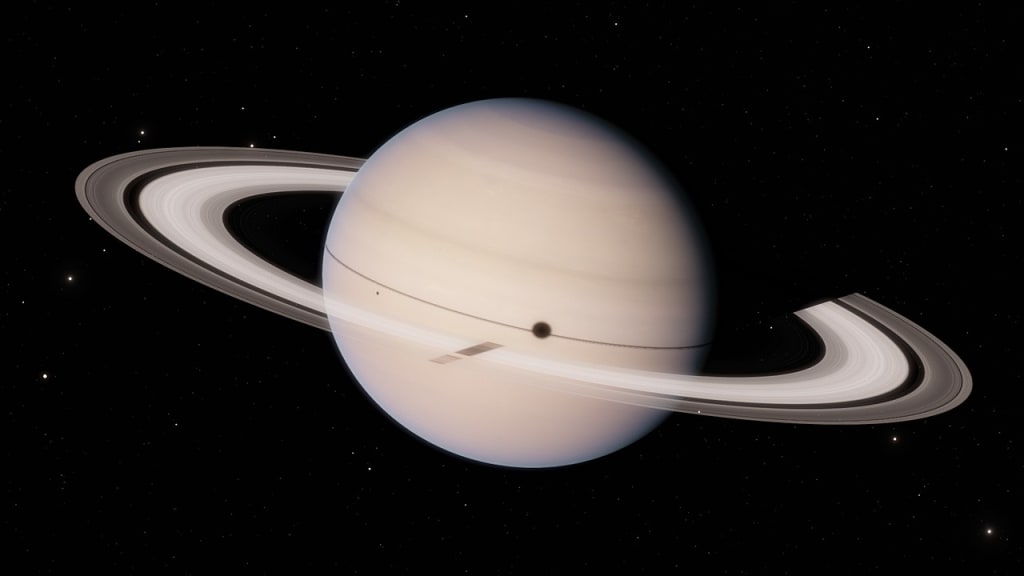Moving 'Beyond Earth'
Charles Wohlforth and Amanda Hendrix Explore Humanity's Potential Future On Titan.

For decades at least, the dream of a human colony moving our species beyond this planet has been a dream shared by both science fiction and science fact. It's an idea that has yet again come into vogue. Yet the question remains: how would we even set about the task and where do we go? While the popular answer seems to be the Moon or Mars, writer Charles Wohlforth and planetary Amanda Hendrix's Beyond Earth: Our Path To A New Home In The Planets seeks to answer both and propose an altogether different destination: Saturn's moon Titan.
To make their case, Wohlforth and Hendrix lay two parallel narrative strands: The Present and The Future. The Present is, perhaps obviously so, the fairly straight forward non-fiction account they present. This takes us from the Space Race to the present day with some interesting sidelines. The pair is critical of NASA, perhaps not unfairly, pointing to the agency's lack of a continuous vision as having helped stall manned space flight to not only Low Earth Orbit (LEO) but for having not done as much research as is needed before sending humans off on long term space flights. The pair place a lot of faith in the burgeoning private space industry, including a tour of a Space X facility where they're given a tour by the young engineer behind the Falcon 9's second stage. There's also an exploration of the science involved with Titan and just what it might have to offer humanity that neither the Moon nor Mars have as well as discussions about artificial intelligence, balloon probes to scout the planet, and the psychology of sending humans to Titan. It makes not for dry reading but for fascinating glimpses into current and potential future developments.
The other strand, The Future, builds on this but in a different way. Building on the developments they discuss elsewhere in the chapter, the pair turns their gaze upon just how those pieces of technology and development might play out. They build onto those developments a narrative of events ranging from natural disasters, societal changes, and a political will that might lead to the building of the first off world colony. These sometimes bleak but often surprisingly optimistic sections often read like plot summaries of some unwritten science fiction novel (and I was reminded at times of Neal Stephenson's Seveneves that I read two years ago), with one yearning for a little more detail to flesh out the narrative. Many of the leaps seem quite logical and the pair also presents historical precedents for some of the ideas being presented. What it does offer, more than anything else, is a glimpse into what the work being done now might lead to tomorrow.
While it makes for fascinating reading, the book does have some minor issues. Some of the leaps taken are sometimes difficult to follow. For example, chapter five “The Health Barrier To Deep Space” begins by showing some of the side effects of long term space flight upon the human body during missions on the ISS which make for interesting reading. What it leads to is a Future segment involving a Chinese lunar base and a mission to Mars that goes catastrophically wrong due to a breakdown in the astronauts' cognitive functions, which makes little sense based on the research presented by Wohlforth and Hendrix earlier in the same chapter. Other times, the speculative leaps they take seem a step too far but those occasions are few and far between, mainly coming at the far end of the book's narrative into perhaps the most deeply speculative parts of the book. These are largely minor issues and ones that don't distract too much from the main thrusts of the book.
For those with an interest in just how humanity might finally become a multi-planet species, Beyond Earth presents a good case. Part study of current technological developments, current planetary exploration, and speculative work, Wohlforth and Hendrix combine both approaches rather nicely. It isn't an overly optimistic work by any means, a cheer-leading effort that preaches to the choir (to mix one's metaphors) but a work that shows a potential way forward. Whether or not any of its pans out is anyone's guess but, for now, it makes for fascinating reading.
About the Creator
Matthew Kresal
Matthew Kresal was born and raised in North Alabama though he never developed a Southern accent. His essays have been featured in numerous books and his first novel Our Man on the Hill was published by Sea Lion Press in 2021.







Comments
There are no comments for this story
Be the first to respond and start the conversation.